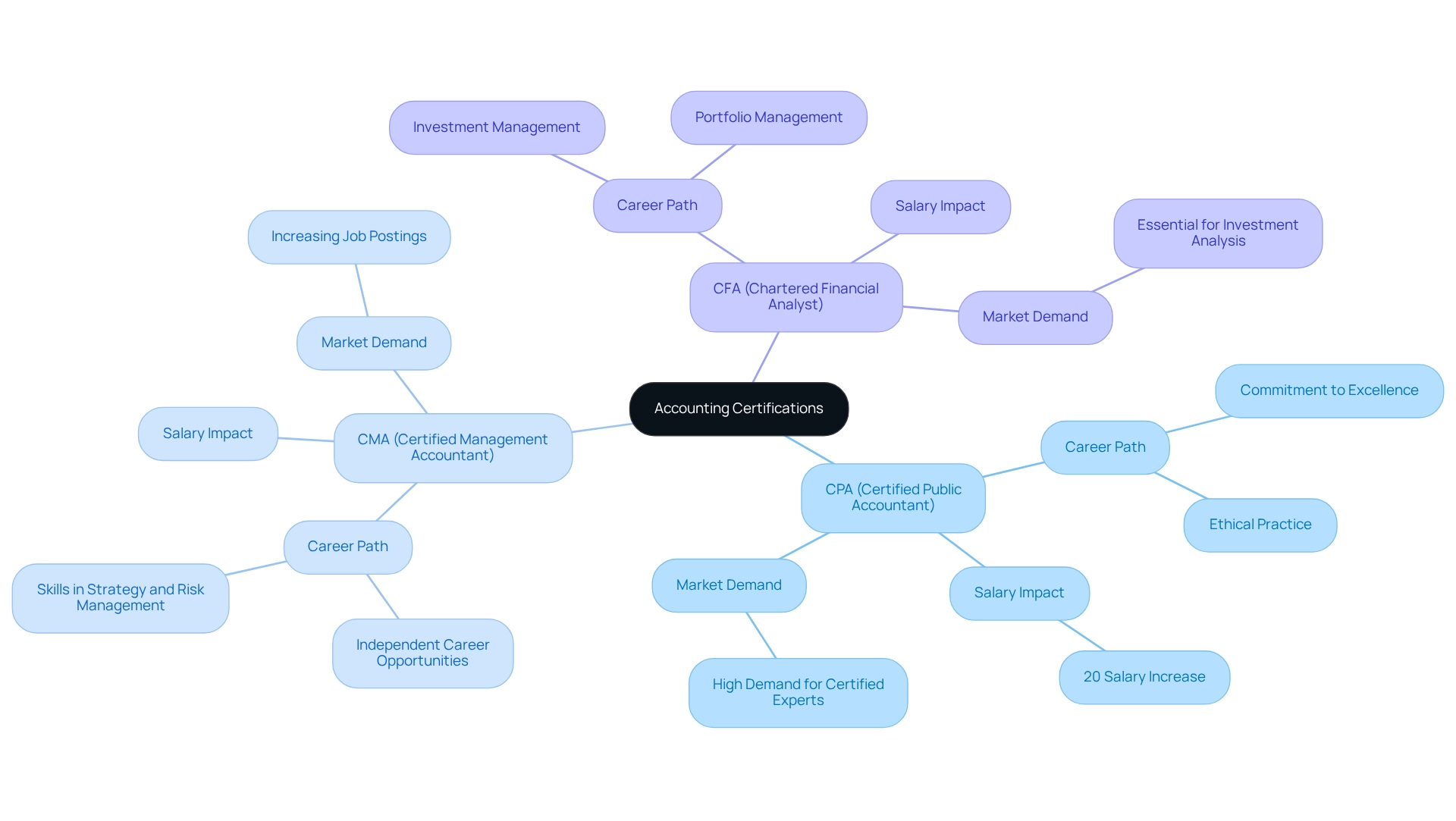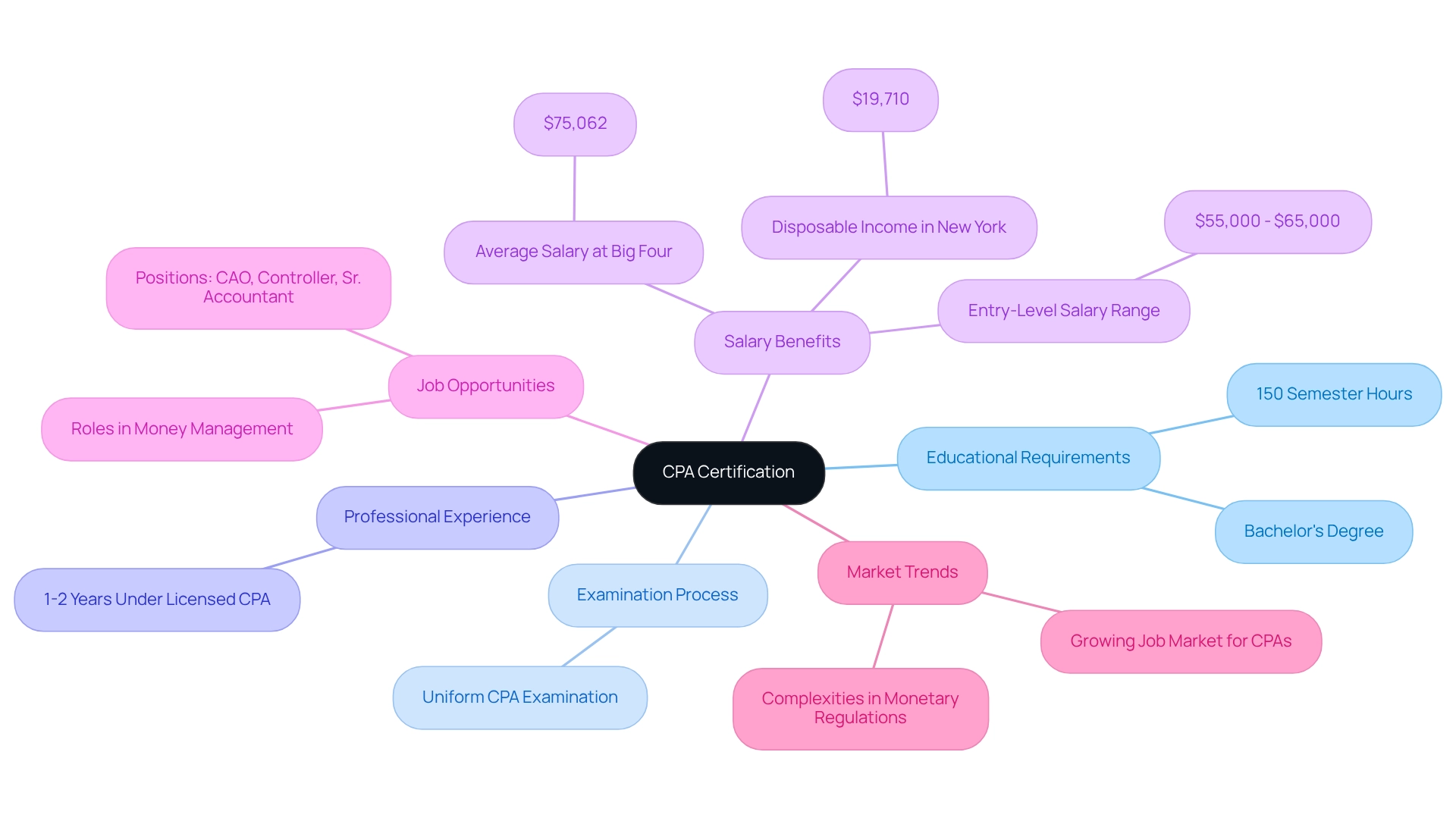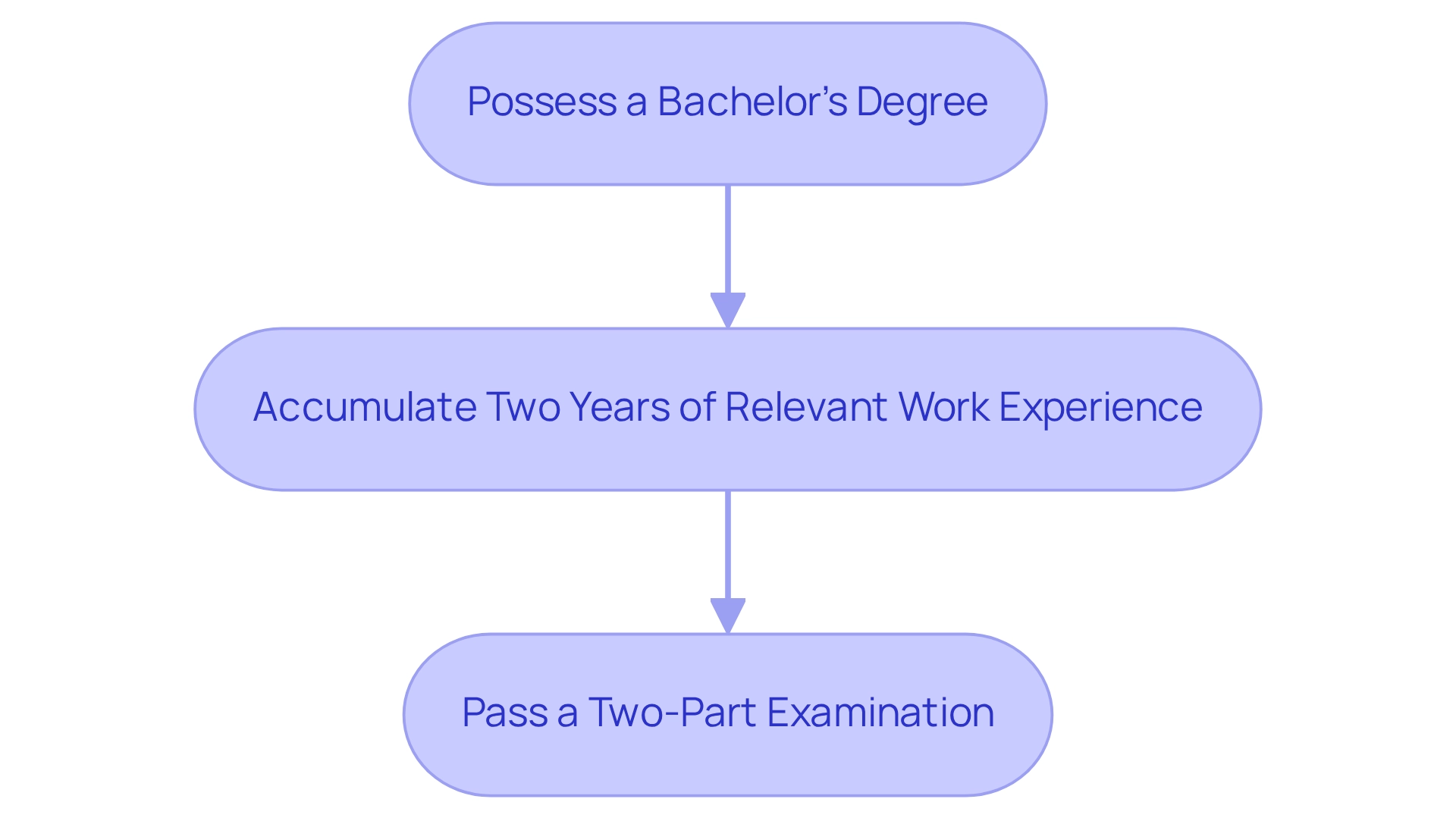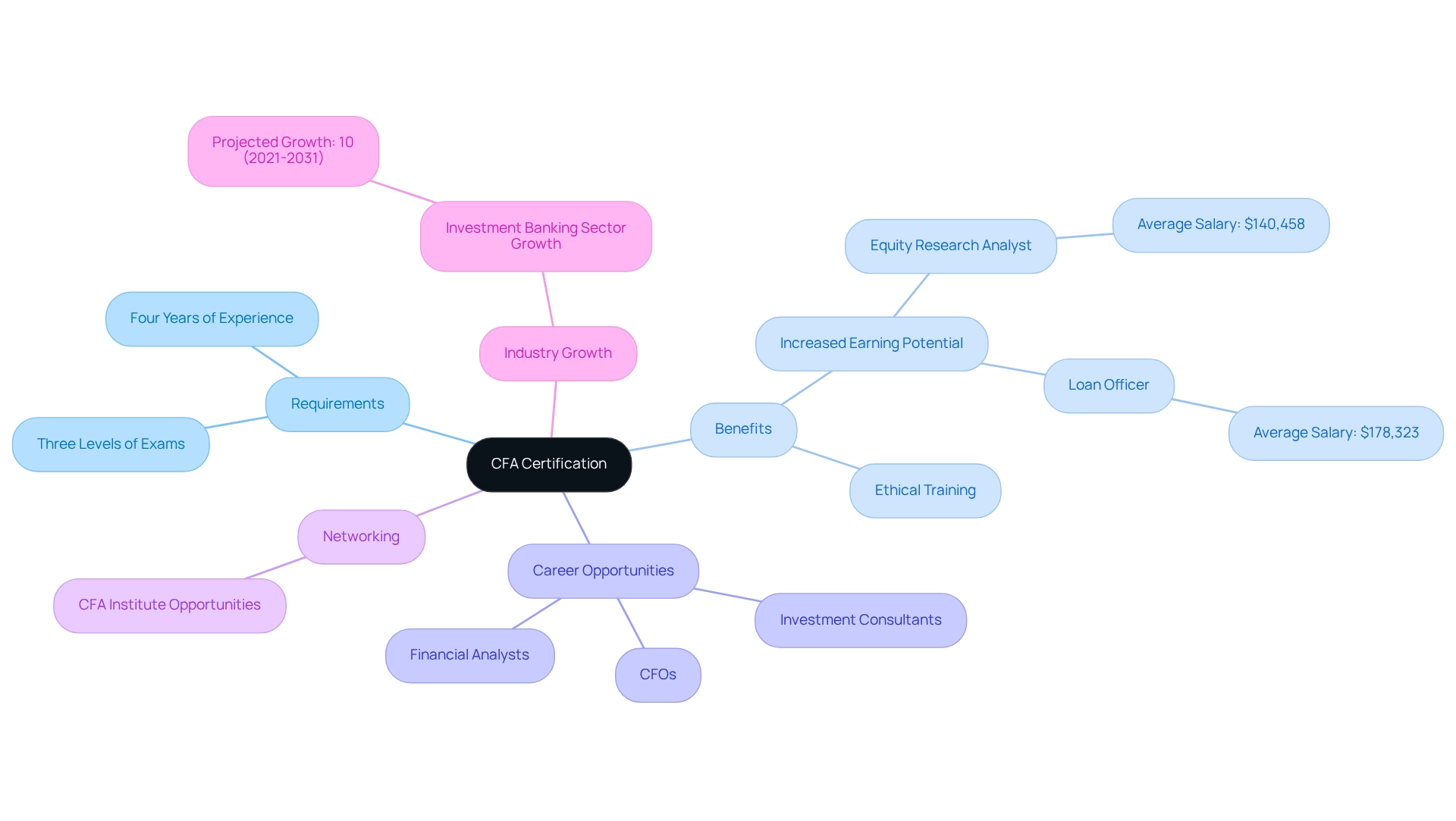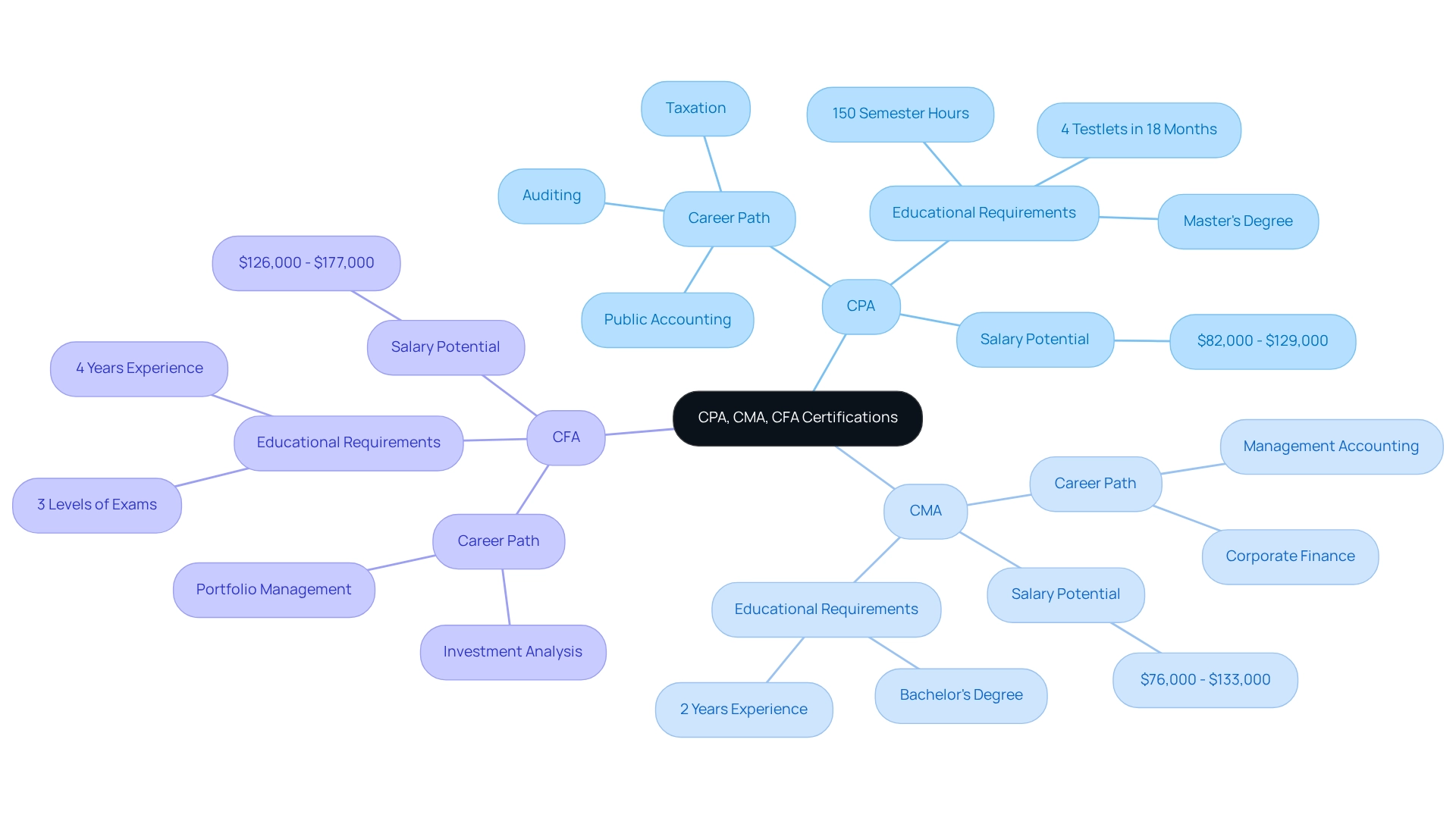Overview
The article provides a comprehensive comparison of the CPA, CMA, and CFA accounting certifications, illuminating their unique career trajectories, educational prerequisites, and salary potential. It underscores that:
- The CPA is predominantly favored for public accounting and auditing roles.
- The CMA is tailored for management positions.
- The CFA is indispensable for investment management.
Each certification markedly enhances job prospects and earning potential within its respective domain.
Key Highlights:
- Accounting certifications like CPA, CMA, and CFA validate expertise and enhance career prospects in accounting and finance.
- CPA designation is highly sought after, with licensed accountants earning up to 20% more than non-licensed peers.
- CMA certification focuses on management accounting, enabling professionals to excel in strategic roles and consultancy.
- CFA credential is essential for careers in investment management, emphasizing investment assessment and portfolio management.
- Job postings requiring accounting credentials have increased by 15% over the past year, highlighting their growing importance.
- CPAs must complete 150 semester hours of education, pass the CPA exam, and gain relevant work experience.
- CMAs require a bachelor’s degree, two years of work experience, and must pass a two-part examination.
- CFAs must pass three levels of exams and have four years of relevant experience, often leading to high salaries in finance roles.
- Salaries for CPAs range from $82,000 to $129,000, CMAs earn between $76,000 and $133,000, while CFAs can make $126,000 to $177,000.
- Each certification offers unique advantages tailored to different career goals within the finance and accounting sectors.
Introduction
In the competitive landscape of finance and accounting, professional certifications stand as essential credentials that can substantially enhance career prospects and earning potential. With a plethora of certifications available—including the Certified Public Accountant (CPA), Certified Management Accountant (CMA), and Chartered Financial Analyst (CFA)—professionals face the critical challenge of selecting the right path that aligns with their career aspirations.
Each certification presents unique advantages, catering to specific roles within the industry, from public accounting and management to investment analysis. As the demand for certified professionals escalates, grasping the nuances of these certifications becomes imperative for anyone aiming to elevate their career in finance and accounting.
What are the specific requirements and benefits of these certifications? How do they impact career advancement in today’s dynamic job market? This article delves into these questions, exploring the specifics of these certifications and their significance in shaping successful careers.
Understanding Accounting Certifications
The best accounting certifications are essential professional designations that validate an individual’s expertise in specific areas of accounting and finance, playing a pivotal role in career advancement. Among the most esteemed qualifications in the industry are the CPA (Certified Public Accountant), CMA (Certified Management Accountant), and CFA (Chartered Financial Analyst). Each credential caters to distinct career paths and specialties, significantly influencing hiring practices and salary expectations across various sectors.
The CPA license symbolizes a commitment to excellence, ethical practice, and continuous learning, making it a highly sought-after qualification. Licensed accountants can earn up to 20% more than their non-licensed peers, highlighting the monetary advantages of acquiring such qualifications. Likewise, the CMA qualification enables professionals to convert their fundamental abilities into prosperous independent careers, providing them with knowledge in strategy, risk management, and analytics. This enables CMA professionals to address business challenges effectively, often leading to successful consultancy ventures. For instance, CMA-accredited individuals frequently utilize their abilities to offer strategic insights that assist companies in enhancing their operations.
The CFA credential, although not as widely mentioned, is essential for those seeking careers in investment management and analysis. It centers on investment assessment, portfolio management, and financial markets, making it a perfect option for professionals seeking to thrive in these fields.
Practical examples demonstrate the concrete advantages of these qualifications. Professionals who have pursued the best accounting certifications, including CPA, CMA, or CFA designations, frequently report enhanced job prospects and increased earning potential. For example, Eric Eddy from CPA Resources Global Professionals highlights the high demand for certified experts, stating that Boutique Recruiting’s capability to provide exceptional candidates swiftly and effectively mirrors this trend in hiring methods.
As of 2025, the significance of accounting credentials continues to rise, with a reported increase in job postings requiring these qualifications by 15% over the past year. Employers are increasingly prioritizing candidates who possess these credentials, emphasizing the need for professionals to enhance their qualifications and marketability in a competitive job market. This trend makes qualifications a critical investment in their careers. How can professionals leverage these credentials to stand out? Boutique Recruiting is well-positioned to assist firms in finding the right talent equipped with these essential credentials.
Exploring the Certified Public Accountant (CPA) Certification
The CPA designation stands as one of the premier accounting certifications within the profession, particularly for individuals aspiring to careers in public accounting, auditing, and taxation. Achieving CPA licensure requires candidates to complete a bachelor’s degree that includes at least 150 semester hours of education, successfully pass the Uniform CPA Examination, and gain a requisite amount of professional experience—typically one to two years under the mentorship of a licensed CPA. This rigorous process not only enhances job prospects but also significantly boosts earning potential; CPAs frequently earn salaries that exceed those of their non-certified counterparts. For example, the average annual salary for accountants at major firms, such as the Big Four, is approximately $75,062, underscoring the value placed on CPA credentials.
Moreover, entry-level public accountants can expect to earn around $55,000 to $65,000 annually, illustrating the economic advantages of obtaining this qualification. The best accounting certifications render CPAs highly sought after for roles in money management, consulting, and corporate finance, emphasizing the credential’s role as a catalyst for career advancement. The complexity of accounting responsibilities often aligns with the size of the organization, suggesting that CPAs may face diverse roles and responsibilities based on their workplace, including positions such as CAO, Controller, and Sr. Accountant.
As the job market for CPAs continues to grow in 2025, driven by increasing complexities in monetary regulations and corporate governance, the best accounting certifications, including the CPA designation, remain essential assets for professionals looking to elevate their careers in the economic sector. Notably, CPAs in high-cost living areas, such as New York, enjoy a disposable income of approximately $19,710, further accentuating the economic benefits of this qualification. In this competitive landscape, exploring multiple job opportunities becomes crucial for career success. Partnering with targeted recruitment services like Boutique Recruiting can provide invaluable support in navigating these options.
Examining the Certified Management Accountant (CMA) Certification
The Certified Management Accountant (CMA) credential stands out as one of the premier accounting certifications for individuals aiming to excel in management accounting and fiscal management roles. To earn the CMA designation, candidates must:
- Possess a bachelor’s degree
- Accumulate two years of relevant work experience
- Successfully navigate a rigorous two-part examination that encompasses planning, performance, and analytics
In contrast to the CPA, which predominantly emphasizes auditing and taxation, the CMA focuses on strategic management and decision-making skills, making it particularly advantageous for those aspiring to leadership positions within organizations.
CMAs are integral to budgeting, forecasting, and performance management, often leading to competitive salaries. Recent data reveals that starting salaries for CMAs can range from $80,000 to $95,000 annually, excluding bonuses and other incentives, influenced by factors such as location and industry. This qualification is especially beneficial for individuals seeking advancement into senior roles, such as manager or CFO.
As emphasized by industry leaders, demonstrating technical and strategic expertise through CMA accreditation significantly enhances the likelihood of securing promotions, underscoring its value as one of the best accounting certifications in the job market. Moreover, organizations that employ CMAs in management capacities reap the rewards of their expertise in driving financial performance and strategic decision-making, positioning the CMA as a crucial asset in today’s competitive landscape. For instance, companies such as [insert specific organizations] have effectively integrated CMAs into their management teams, showcasing the credential’s impact on organizational success.
Additionally, the global environment reveals variations in CMA salaries, as illustrated in a recent case study highlighting a minor decrease in CMA salaries in China, which underscores the importance of this qualification in navigating diverse job markets. Conversely, the statistic indicating a 25.6% decline in non-CMA compensation in the Middle East and Africa further accentuates the advantages of obtaining a CMA.
Analyzing the Chartered Financial Analyst (CFA) Certification
The CFA qualification stands as a prestigious credential within the finance and investment fields, particularly for those aspiring to careers in investment banking, asset management, and analysis. Achieving CFA charterholder status requires candidates to adeptly navigate three levels of exams, each demanding a comprehensive understanding of investment principles, portfolio management, and economic analysis. Moreover, applicants must possess four years of relevant professional experience, underscoring the rigorous standards associated with this designation.
Charterholders often enjoy heightened earning potential, as they are frequently sought after for senior roles within financial institutions. For instance, equity research analysts, who typically hold the CFA designation, earn an average salary of $140,458 annually. Similarly, loan officers, also commonly CFA charterholders, can command approximately $178,323 per year. This trend reflects the increasing demand for CFA charterholders, particularly as the investment banking sector is projected to expand by 10% from 2021 to 2031.
Furthermore, the CFA Institute provides extensive networking opportunities that can significantly bolster career prospects for its members. Companies that prioritize CFA credentials in their hiring practices recognize the value of the rigorous training and ethical standards that accompany this qualification. As Daniel Rodriguez, director of operations at Hill Wealth Strategies, notes, the exams assess candidates’ grasp of economics and ethical financial scenarios, equipping CFA charterholders to navigate the complexities of the finance sector adeptly. This ethical training specifically prepares candidates to handle real-world financial situations with integrity and professionalism.
In summary, the CFA qualification not only opens doors to diverse career paths, including financial analysts, investment consultants, and CFOs, but also positions holders for lucrative opportunities in a competitive job market. The versatility of CFA charterholders across various roles further emphasizes the significance of this designation in the finance sector.
Comparative Analysis: CPA, CMA, and CFA Certifications
A comparative analysis of the CPA, CMA, and CFA qualifications reveals distinct pathways tailored to different career goals. The CPA designation primarily caters to those pursuing careers in public accounting, auditing, and taxation. In contrast, the CMA is crafted for professionals focused on management accounting and corporate finance, while the CFA is tailored for those specializing in investment analysis and portfolio management.
Educational requirements differ significantly among these qualifications. To qualify for the CPA, candidates must complete 150 semester hours of education, which often includes a master’s degree, and they must pass all four CPA testlets within an 18-month period. The CMA requires a bachelor’s degree along with two years of relevant experience, whereas the CFA necessitates passing three levels of exams and accumulating four years of professional experience in a related field.
Salary potential also varies across these qualifications. As of 2025, CPAs typically earn between $82,000 and $129,000, reflecting their high demand in public accounting. CMAs command competitive salaries ranging from $76,000 to $133,000, particularly in corporate environments. CFAs, on the other hand, often achieve lucrative compensation, with salaries ranging from $126,000 to $177,000, especially in investment roles. This competitive salary environment underscores the importance of these qualifications in the job market.
As Brianna Flavin, Senior Content Manager, notes, “Once you’ve earned a degree, it’s clear an additional credential—whether it’s a CMA, CPA or CFA—is important to distinguish yourself in your career.” Ultimately, the decision to pursue a CPA, CMA, or CFA should align with individual career aspirations and the specific skills one wishes to develop. Each of the best accounting certifications offers unique advantages that cater to different sectors within the finance and accounting landscape, making it essential for professionals to consider their long-term goals when choosing a path. Furthermore, both the CPA and CFA exams require significant preparation time, with the CPA exam recommended to take 300-400 hours of study, emphasizing the dedication needed to succeed.
Conclusion
The landscape of finance and accounting is increasingly defined by the pursuit of professional certifications, which serve as critical assets in advancing careers and maximizing earning potential. This conclusion emphasizes the significance of three prominent certifications—CPA, CMA, and CFA—each tailored to distinct career trajectories within the industry. The CPA stands out for its emphasis on public accounting, auditing, and taxation, while the CMA focuses on management accounting and strategic decision-making. Conversely, the CFA is designed for those aiming for excellence in investment management and financial analysis.
These certifications not only enhance job prospects but also lead to substantial financial rewards. CPAs enjoy higher salaries and increased demand for their skills, reflecting the value placed on this credential in public accounting roles. Similarly, CMAs are positioned for leadership roles and competitive salaries, particularly in corporate finance. Meanwhile, CFA charterholders command lucrative compensation in investment sectors, highlighting the certification’s prestige and relevance.
In a competitive job market, the choice of certification should align with individual career goals and aspirations. The decision to pursue a CPA, CMA, or CFA is significant, with each offering unique advantages that cater to different sectors within finance and accounting. As the demand for certified professionals continues to rise, investing in these credentials becomes paramount for those seeking to distinguish themselves and thrive in their careers. Ultimately, understanding the nuances of each certification can empower professionals to make informed decisions that will shape their future in the finance industry. Are you ready to take the next step in your career? Investing in your professional development is not just a choice; it is a strategic move towards achieving your aspirations in finance.
Frequently Asked Questions
What are the best accounting certifications?
The best accounting certifications include the CPA (Certified Public Accountant), CMA (Certified Management Accountant), and CFA (Chartered Financial Analyst). Each certification caters to different career paths and specialties in accounting and finance.
Why is the CPA certification highly regarded?
The CPA certification symbolizes a commitment to excellence, ethical practice, and continuous learning. It is highly sought after because licensed accountants can earn up to 20% more than their non-licensed peers.
What advantages does the CMA certification provide?
The CMA certification helps professionals develop skills in strategy, risk management, and analytics, enabling them to tackle business challenges effectively and often leading to successful consultancy ventures.
What career opportunities does the CFA credential offer?
The CFA credential is essential for careers in investment management and analysis, focusing on investment assessment, portfolio management, and financial markets.
How do accounting certifications impact job prospects and salary?
Professionals with accounting certifications, such as CPA, CMA, or CFA, often report enhanced job prospects and increased earning potential. For instance, CPAs at major firms can earn an average annual salary of approximately $75,062.
What are the requirements to become a CPA?
To become a CPA, candidates must complete a bachelor’s degree with at least 150 semester hours of education, pass the Uniform CPA Examination, and gain one to two years of professional experience under a licensed CPA.
What is the salary range for entry-level public accountants?
Entry-level public accountants can expect to earn between $55,000 to $65,000 annually.
How is the job market for CPAs expected to change by 2025?
The job market for CPAs is expected to grow by 2025, driven by increasing complexities in monetary regulations and corporate governance, making CPA credentials essential for career advancement.
What economic benefits do CPAs enjoy in high-cost living areas?
CPAs in high-cost living areas, such as New York, enjoy a disposable income of approximately $19,710, highlighting the economic advantages of obtaining CPA certification.
How can professionals leverage their accounting certifications for career success?
Professionals can enhance their qualifications and marketability by obtaining certifications, as employers increasingly prioritize candidates with these credentials in a competitive job market. Partnering with recruitment services like Boutique Recruiting can also provide support in navigating job opportunities.
